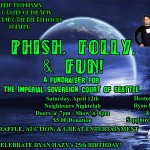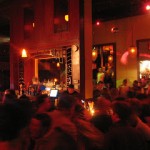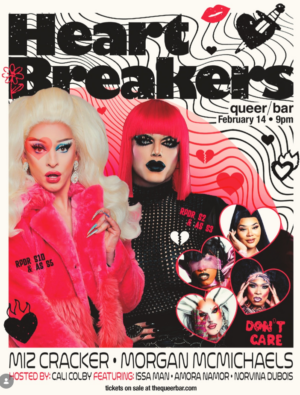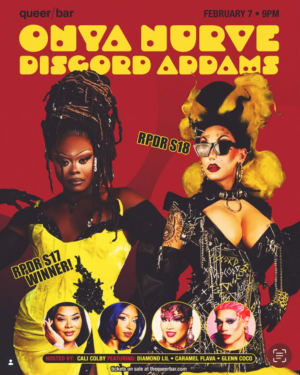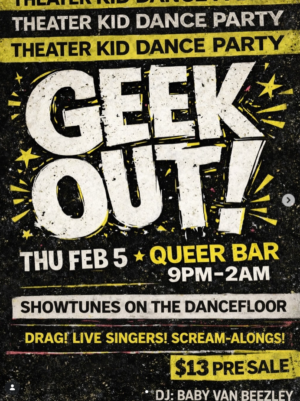Exclusive Interview with Ann Bannon, author of Beebo Brinker books
By Miryam Gordon
Ann Bannon is going to participate in the Seattle Women’s Chorus performances. April 6 SWC will be in  though Ann won’t be there in person, only her words will be, and April 12 (8pm) and 13 (2pm) at Meany Hall on the UW campus. She will talk about her books and the times and the repression. The Chorus will sing original music to illustrate some of those ideas. This is a historic opportunity for local lesbians to hear about a very recent past that has only been overcome within the last ten to fifteen years. Then Cris Williamson will take over the second half and sing some of your favorites with and without the Chorus. You won’t want to miss it!!!!
though Ann won’t be there in person, only her words will be, and April 12 (8pm) and 13 (2pm) at Meany Hall on the UW campus. She will talk about her books and the times and the repression. The Chorus will sing original music to illustrate some of those ideas. This is a historic opportunity for local lesbians to hear about a very recent past that has only been overcome within the last ten to fifteen years. Then Cris Williamson will take over the second half and sing some of your favorites with and without the Chorus. You won’t want to miss it!!!!
Women who found Beebo Brinker and her friends, who read the “secret code” and understood that Ann Bannon’s books were about lesbians, also felt heard and understood and less alone. They felt like there was someone out there who was like them. They were able to find community, and hope. But before the books, there was a young woman named Ann who was struggling to understand her own inner feelings and didn’t have much to hang on to. She, like many in her decade, felt compelled to marry and expected to have the typical house, two kids and a yard.
I asked Ann how she found herself able to write her books, while being closeted and confused and even self-hating as feeling wrong and bad. How did she find her way to creating her art and what sustained her in that journey? Ann graced me with her story and comments about the upcoming concert.
Ann’s words:
Especially for younger women, this concert is important. Some are very well informed, but a lot of are obsessed with what’s happening right now and are not aware of all the hopes and ups and downs of those who proceeded them. There was the women’s movement, but lesbian pulps were on the scene 15 or 20 years before that. There’s a lot to share and it’s wonderful that the SWC is going to present something, particularly using music to tell the story!
I couldn’t quite conceptualize this when they had the idea for this and Brenda and Eric (Chorus members who have composed the original music) have done a marvelous job with this huge process. I’m very impressed and excited and it will be fun to participate in it.
I’m older than Cris (Williamson), but she came in at a time when there was a great deal of turmoil and we didn’t have very much (support), if you think about it. In the 50s and 60s, we didn’t have women’s bookstores, we didn’t have community centers, there was very little in entertainment and even those successful gay celebrities were very fearful to let people know of their sexual orientation. People could lose marriages and children. What we had back then were the bars and the pulp paperbacks and it was really in the late 60s and 70s that women (in the feminist movement) began to join us and bit by bit the lesbians could begin to think of themselves as a community.
I was kind of spurred into action by reading the first original lesbian pulp paperback by Vin Packer (the pseudonym of Marijane Meaker), called Spring Fire. There were mostly hardbacks and some hardbacks were then printed in paper covers. The original paperbacks were different. Paperbacks became an economical way to get books to the troops in WWII, so that gave paperbacks a boost, and in the early 50s people began to write original books in paperbacks, so you had sci fi, cowboys, romance, mysteries, and the lesbian pulps crept in and we were all side by side in the drugstore. They were distributed not through bookstores which were hardcover distributors, but in popular venues that people dropped into. We knew as we were writing that paperbacks were intended to be ephemeral literature and were intended to be thrown away, which people did. I began to find them on drugstore shelves in the mid 50s, newsstands, bus stations, everyone had them. They were distributed universally.
I had always won awards for writing. When I found Spring Fire, I thought, “I could write something like that,” and decided I wanted to write a lesbian love story, but I also wanted to write something to show my mother. It was important to have my mother’s respect. I know she loved me and was proud of me, but I didn’t want to cover a subject that had so much opprobrium attached to it. That’s why I (initially) put the two women in the back of the book. I knew I was camouflaging; I knew what I wanted to write about. I didn’t know when I was first writing if I would ever get a reading at a hardcover publisher.
I think I had known from childhood that I was not one of the gals in the same way that my childhood friends dreamed of marriage and children and domestic tasks. I wasn’t like that at all and I remember feeling as if I were a spy sometimes at a birthday party or in the classroom. I looked like everybody else but I wasn’t feeling like everyone else. Finding the lesbian books in the 1950s gave me a kind of direction and inspiration that I could write this too. By that time, I was married.
I felt that I could “pass” that I could do it; that there was no option of embarrassing or humiliating my family. And I found a nice guy, he wanted to get married, we got married and everyone else was doing it and I felt, “this is how it works.” The world, especially for women in the 50s, was very constrained in the traditional model. Women had their place in the home and it was only as I found those books that I began to realize that other women were bravely living their lives more honestly and coming to grips with their feelings. I didn’t think I’d be able to join them (by coming out). I took my marriage seriously. My children had to come first. My mother had soldiered thru a bad marriage, her mother had done that, and you just put one foot in front of the other, and I think I convinced myself that I could live in my imagination.
They (the stories) let me imagine myself in the life I thought I could not have and became a kind of a love letter to women. I can’t go live in
I was living in
I had a great struggle to get my husband to agree to this; his idea was that I was a sheltered flower and didn’t know how to take care of myself and couldn’t just be let out of the house by myself. He knew I was writing, but didn’t really care what about. He just thought it was a wasted effort but didn’t want to hurt my feelings. I found out there was an all women’s hotel in
I promised that I would do so. I was very intrigued with
I didn’t have children, yet, but children were very much in our plans and I knew that was coming. On the other hand, I was desperate to write and took my manuscript and met the editor and he read it in a couple of days out of friendship for Marijane, whose book had sold many copies and made him a lot of money. He gave me back the book and said, “Well, it’s not a very good book, BUT…” I thought the “but” was hopeful. He said, “I think we could make it work. You’ve written a college romance, but the real story is the relationship with two women.” It was a book about things like the spring carnival and frat boys and it was everybody’s first novel. What the editor immediately recognized was it was a lesbian love story trying to burst out of a conventional novel.
The two girls that I kind of stashed in the corner and tried to downplay were the heart of the story. So the editor told me to go home and cut the length of the book in half, and tell the story of the two young women who were sorority sisters. I did that, and in the meantime, I went several times to
After about a month and a half, I brought the manuscript back to the editor. It took me about a month and a half to perform the surgery on it and reorient it to the two girls. Again, he read it right away, and accepted it without changing a word. You have to bear in mind that I had spent the previous 6 to 8 months on the book. I was inspired, I worked all day every day and did nothing else. And that became Odd Girl Out.
(What did you tell your husband during this time period?)
I told my husband as little as I could, but he knew I was corresponding with a
Sometimes, people don’t want to know things. He liked his life, he did love me and the kids. I, meanwhile, would have qualified for an Oscar by putting up a good front and I figured, “I made this choice and I’m going to stay and take care of my children until they were young adults.” And I did. And as soon as I could, I left (the marriage).
I will talk a little about this and what the world was like back then during my comments in the Chorus concerts. (Note: Ann will not be at the
(During this period of writing, you must have had some experiences that would help you write about it.)
I did have some connections (secret relationships) but nothing that would qualify as a romance. As soon as the divorce was final, I felt free to open up my life a little. I really did my living in the pages of those books. I also had other (emotional) outlets all through the years and I was doing introductions and essays of the (5) books as they came out. It was a case of protecting my children, and my mother was still alive and handled the whole situation very gingerly. So, I really think I did it the way my family needed me to do it.
You can do the “armchair research,” where you go through what everyone else wrote and then write something, or the other kind is the “field work” dissertation, where you pack your bag and do urban sociology and interview people and do (yourself) what you’re going to write about. Odd Girl Out was my armchair dissertation, and I Am A Woman (book #2) was my field work dissertation. (I have to say that people laugh at those titles, and the covers, but the editor came up with all my titles. I had nothing to do with that.)
I was able to get up to
People (today) don’t think about it this way: Way back then, when we were young, we had internalized a lot of that toxic belief about the lesbian community and we felt that we ourselves were infected with it. It was hard to think in terms of stepping out of your own life to look back at the way you were behaving and others were behaving toward you and realize how utterly baseless it was (that toxicity). I saw what very good people there were in the world who were gay and lesbian and doing very good things.
You have to understand that to be a gay person, at that time, was an illegal identity. If you were caught holding hands with someone of the same sex, if you were a woman wearing more than three pieces of male clothing, if you were caught in a lesbian bar, you went to jail. The medical establishment, your parents, the government, everyone you know, is telling you this (gayness) is a terrible thing and it’s a failure of will. There was no one who could talk to you to tell you that all of what they were saying is horsepucky.
To get more information about the concerts, Ann Bannon, or get tickets, go to www.flyinghouse.org




